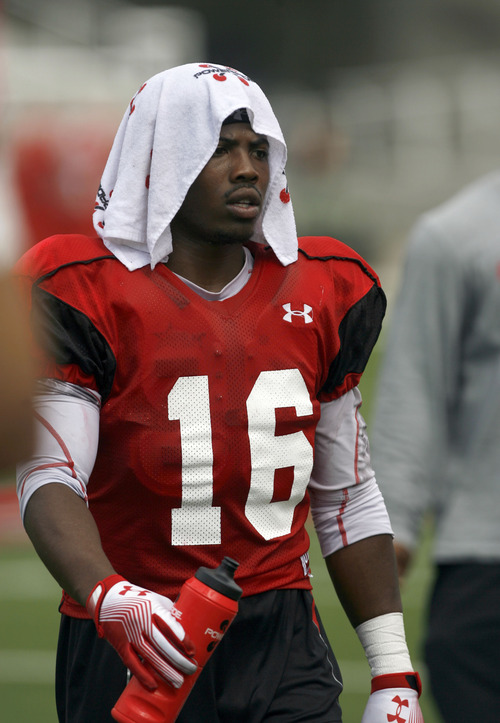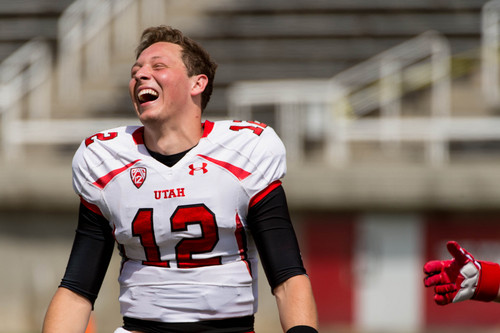This is an archived article that was published on sltrib.com in 2014, and information in the article may be outdated. It is provided only for personal research purposes and may not be reprinted.
Adam Schulz came to Salt Lake City armed with a college fund that his parents started at his birth and that his grandparents added to for 18 birthdays.
Within one semester, the money was gone.
The University of Utah estimates that attendance costs a typical out-of-state student $39,000. But Schulz was hardly typical: As a walk-on quarterback, he was so often practicing and studying playbooks that, besides his schoolwork, he had little time for anything else.
Still, he cut a check.
Schulz is among a handful of Utes who last week praised NCAA legislation entitling all athletes, including walk-ons, to unlimited meals and snacks.
"Walk-ons are out here trying to chase a dream," said the junior, whose finances led him to consider leaving the U. before he earned a scholarship as a redshirt freshman. "There's so many of them on this team right now — they work their butts off."
Previously, scholarship athletes received three meals a day, and walk-ons got nada.
The April 15 decision by the NCAA legislative council helps bridge a long-standing divide between scholarship athletes and those who pay their own way.
"They're doing the same amount of work as me," said sophomore offensive lineman Isaac Asiata. "I know I'm on scholarship, but I know that's not right. That's just food."
The Utes, like other football teams in the state, boast a number of former walk-ons who gained scholarships the hard way. Those players still remember what it felt like when their bellies and wallets were empty.
Senior wideout Geoffrey Norwood said that when he was a walk-on, teammates would sneak food to him. He never blamed the program, he said, because it wasn't Utah's fault.
"It's the NCAA rules," he said. "What they say goes, and we can't get in trouble."
The new rule takes effect Aug. 1.
The training table has become a hot-button issue in the last few years, reaching a crescendo when UConn basketball guard Shabazz Napier — a scholarship athlete — said he went to bed "starving" because he couldn't afford to buy food.
Previous guidelines governed such minutiae as whether a bagel qualified as a snack. If you put cream cheese on it, the NCAA said, it was a meal. Critics of the NCAA also pointed to a self-reported violation from Oklahoma football as an outrage: Three players were penalized for eating an extra serving of pasta at a graduation banquet and ended up paying $3.83 each for their portions.
It should come as no surprise that coaches welcome the loosening of the guidelines. They want their athletes properly fed, whether they're paying their own way or not. Cornerbacks coach Sharrieff Shah said he sometimes went to bed hungry when he played at Utah, and he hears plenty of similar complaints from his players now.
Three square meals isn't always enough for bodies that burn energy at a higher rate than the average college student, Shah said.
"Kids need to eat. I don't care if you're a gymnast, a swimmer — you need to eat," said Shah, whose son Sharrieff Shah Jr. is a walk-on linebacker at Utah. "They spend thousands of calories, and they're not being nourished properly at the current rate. This change is going to be good in every aspect."
The rule change comes as college athletics' governing body falls under increased scrutiny for how student-athletes are compensated — particularly in football and basketball, which generate billions of dollars in revenue. Although athletes and coaches welcome unlimited meals, discussions about increased athlete stipends or alternate sources of revenue are ongoing.
Coaches say they'd like to see more rule changes that benefit players, and that athletic director Chris Hill is one of the people lobbying on their behalf. In the meantime, safeties coach Morgan Scalley said, the Utah coaches do "everything in our power to give our players what they deserve and what's theirs."
"As long as Coach Whittingham is here, that's how it's going to be," he said. "The players will always be first, always eat first, we give them as much money as we can give them, that's how this program is."
In the meantime, a countdown has begun for walk-ons: Only three months until their meals no longer come out of their own piggy banks.
"It means we'll be able to treat them right," said junior defensive tackle Daniel Nielson, one of Schulz's best friends. "Whoever knows however many hundreds of dollars of food they're not paying out of their pockets to eat. I think finally the NCAA has done something to give some love to the players." New training table rules for Division I
Last week, the NCAA passed new guidelines for Division I schools providing meals and snacks for athletes:
• Schools can provide unlimited meals and snacks when athletes are required to participate in workouts, film study and other mandatory periods including in the summer.
• Schools can provide meals and snacks incidental to participation outside the playing season.
• The school doesn't have to deduct the cost of incidental meals and snacks from the board allowance of athletes.
• Schools are permitted to determine if they want to adjust meal schedules, such as four meals a day instead of three, to better meet athletes' nutritional needs.





